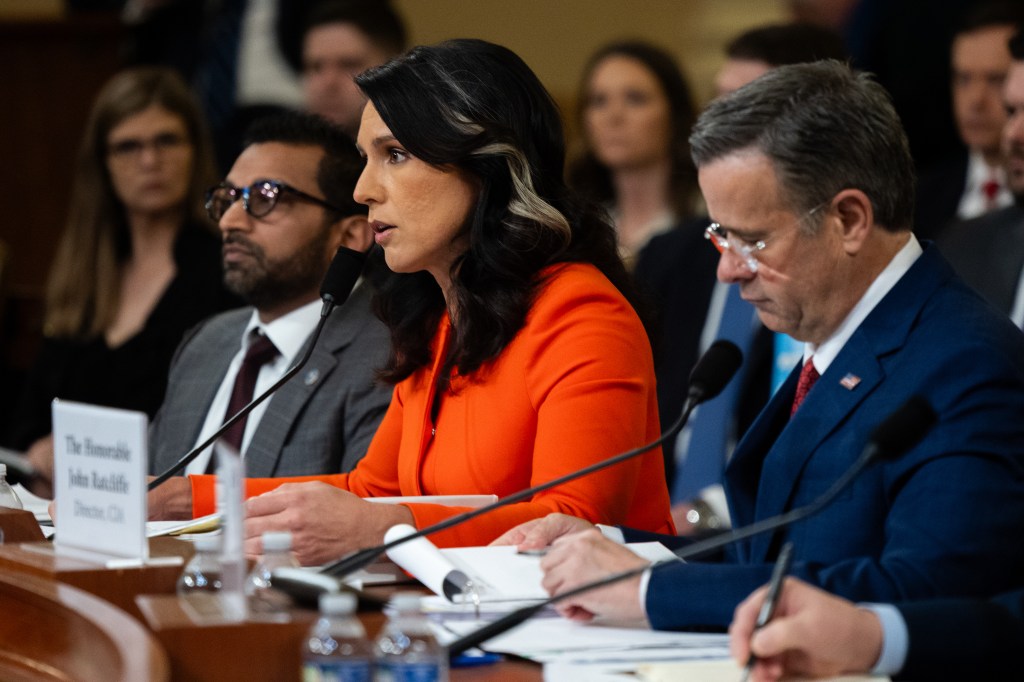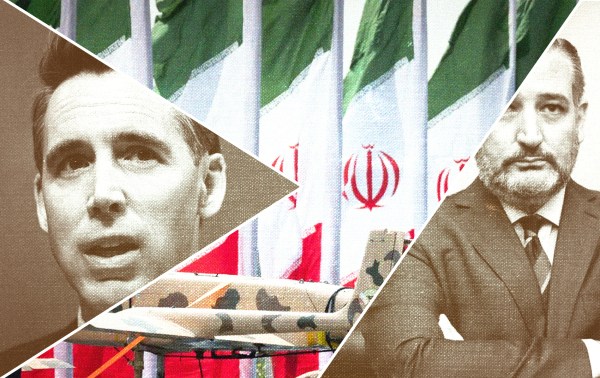Editor’s Note: This fact check has been updated to include additional claims made by Director of National Intelligence Tulsi Gabbard since we published it on Thursday.
President Donald Trump caused a stir Tuesday when he publicly disregarded congressional testimony that Director of National Intelligence Tulsi Gabbard gave in March. When asked about Iran’s nuclear capacities, Trump told reporters while aboard Air Force One that the Islamic Republic of Iran was “very close” to obtaining a nuclear weapon.
When asked about the Annual Threat Assessment (ATA) testimony Gabbard delivered to Congress March 25, in which she said the U.S. intelligence community “continues to assess that Iran is not building a nuclear weapon,” Trump appeared to disagree with Gabbard’s assessment. “I don’t care what she said,” Trump said. “I think they were very close to having it.”
Later Tuesday, Gabbard claimed that her congressional testimony was fully aligned with Trump’s comments, and blamed the media for what she indicated was an inaccurate portrayal of her March comments. “President Trump was saying the same thing that I said in my annual threat assessment back in March,” she said. “Unfortunately, too many people in the media don’t care to actually read what I said.”
A review of Gabbard’s testimony shows that Trump was not “saying the same thing” she did in her threat assessment. At no point did Gabbard communicate that Iran was “very close” to having a nuclear weapon. Instead, she explicitly cited intelligence reports indicating Iran was not building one.
On Friday, a day after this fact check was published, Gabbard tweeted from her official X account the following statement, doubling down on her initial claim:
The dishonest media is intentionally taking my testimony out of context and spreading fake news as a way to manufacture division. America has intelligence that Iran is at the point that it can produce a nuclear weapon within weeks to months, if they decide to finalize the assembly. President Trump has been clear that can’t happen, and I agree.
Here’s the update on Iran that Gabbard provided to Congress in March.
Iran continues to seeks expansion of its influence in the Middle East, despite the degradation to its proxies and defenses during the Gaza conflict. Iran has developed and maintains ballistic missiles, cruise missiles, and UAVs, including systems capable of striking U.S. targets and allies in the region. Tehran has shown a willingness to use these weapons, including during a 2020 attack on U.S. forces in Iraq and in attacks against Israel in April and October 2024. Iran’s cyber operations and capabilities also present a serious threat to U.S. networks and data.
The IC continues to assess that Iran is not building a nuclear weapon and Supreme Leader Khamenei has not authorized the nuclear weapons program he suspended in 2003. The IC is closely monitoring if Tehran decides to reauthorize its nuclear weapons program. In the past year, we have seen an erosion of a decades-long taboo in Iran on discussing nuclear weapons in public, likely emboldening nuclear weapons advocates within Iran’s decision-making apparatus. Iran’s enriched uranium stockpile is at its highest levels and is unprecedented for a state without nuclear weapons.
Iran will likely continue efforts to counter Israel and press for a U.S. military withdrawal from the region by aiding, arming, and helping to reconstitute its loose consortium of like-minded terrorist and militant actors, which it refers to as its “Axis of Resistance.” Although weakened, this collection of actors still presents a wide range of threats, including to Israel’s population, U.S. forces deployed in Iraq and Syria, and to U.S. and international military and commercial shipping and transit.[block]
When asked to specify which of Gabbard’s comments were supposed to communicate that Iran was close to getting a nuclear weapon, an official with the Office of the Director of National Intelligence (ODNI), as well as a White House spokesman The Dispatch Fact Check reached out to separately, stated, “All the points DNI Gabbard made during the ATA hearing outside of the singular statement that ‘Iran is not building’ a nuclear weapon, point to the country being very close to building one.”
However, the material the ODNI official and White House spokesman supplied to back up that assertion was inaccurate. In separate exchanges, they provided The Dispatch Fact Check four quotes they said were taken from Gabbard’s full ATA testimony. But the first two snippets of the provided text were remarks from Republican Sen. Tom Cotton of Arkansas, not Gabbard.
“The supreme leader of Iran now faces a stark choice thanks to President Trump,” Cotton said at the March 25 hearing, which the ODNI official and the White House spokesman misattributed to Gabbard. “The supreme leader can fully dismantle his nuclear program or he can have it dismantled for him.” The second wrongly attributed quote: “Iran’s nuclear program continues apace.”
The Dispatch Fact Check followed up with the ODNI on Friday, and the official acknowledged that the inclusion of Cotton’s statements was accidental.
Neither of the two quotes correctly attributed to Gabbard’s ATA testimony shows that she warned Iran was “very close” to building a nuclear weapon. Instead, Gabbard notes that nuclear weapons advocates working within the Iranian regime have likely become more emboldened to speak out, and that Iran’s uranium enrichment program is drawing concern.
Even if Gabbard believed Iran’s progress on uranium enrichment brought Tehran “very close” to having a nuclear weapon, she never stated as much to Congress in March. Gabbard did not even specify whether she believed that Iran’s enriched uranium stockpile was approaching weapons-grade, the concentration of purified uranium needed to produce nuclear weapons.
As her testimony clearly shows, Gabbard said Iran was “not building a nuclear weapon” and that the Iranian Supreme Leader Ali Khamenei “has not authorized the nuclear weapons program” he said he ended more than 20 years ago. At no point does Gabbard indicate that Iran was working to create nuclear weapons, never mind “very close” to building one. Gabbard even adds, “The [intelligence community] is closely monitoring if Tehran decides to reauthorize its nuclear weapons program.”
If you have a claim you would like to see us fact check, please send us an email at factcheck@thedispatch.com. If you would like to suggest a correction to this piece or any other Dispatch article, please email corrections@thedispatch.com.










Please note that we at The Dispatch hold ourselves, our work, and our commenters to a higher standard than other places on the internet. We welcome comments that foster genuine debate or discussion—including comments critical of us or our work—but responses that include ad hominem attacks on fellow Dispatch members or are intended to stoke fear and anger may be moderated.
With your membership, you only have the ability to comment on The Morning Dispatch articles. Consider upgrading to join the conversation everywhere.